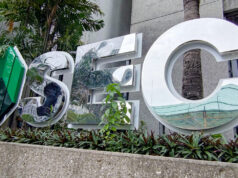BSP setting up MSME credit risk database
THE CENTRAL BANK has been working to establish a credit risk database to help deserving micro, small and medium enterprises (MSMEs) tap funds.
“The BSP has been working with the Credit Information Corp. (CIC) in building a strong and reliable credit information system. Likewise, we are working with the Government of Japan to establish a Credit Risk Database (CRD),” Bangko Sentral ng Pilipinas Governor Benjamin E. Diokno said during an event at the Manila Hotel on Aug. 16.
“This will produce scoring models predicting the creditworthiness of SMEs to help improve their access to finance through risk-based lending and lessen the dependence of banks on collateral,” he said.
MSMEs account for 99.6% of the country’s enterprises and generate 61.6% of employment, but contribute just 3.32% to gross domestic product, according to Mr. Diokno.
A December 2018 working paper of Tokyo-based Asian Development Bank Institute (ADBI), titled: “The Role of SMEs in Asia and Their Difficulties in Accessing Finance,” proposed development of credit information and credit-rating systems to help small businesses skirt banks’ conventional collateral requirement.
“If other parts of Asia could establish such systems to accumulate and analyze credit risk data and to measure each SME’s credit risk accurately, SMEs would be able to raise funds from the banking sector,” according to the ADBI paper.
The paper also proposed the establishment of specialized banks for SMEs.
Mr. Diokno noted in his speech that MSMEs account for just 6.2% of total banking loans and 9.2% of total business loans, despite the fact that this segment accounts for bulk of the Philippine business community.
“Despite having considerable growth prospects and being a source of livelihood for millions of Filipinos, the MSME sector has not realized its potential.”
Mr. Diokno said that MSMEs are reluctant to approach banks due to lack of collateral and credit history needed for loan application, with banks regarding them as “low-profit and high-risk” enterprises.
The MSMEs “have limited business capacity and financial management skills to capably meet loan requirements,” Mr. Diokno said.
“In addition, they have limited knowledge of alternative modes of financing.”
He cited laws designed to address constraints to MSMEs’ access to credit such as Republic Act No. 11055, or the Philippine Identification System Act, and RA 11057, or the Personal Property Security Act; as well as the proposed amendment of Republic Act No. 10000, or the Agri-Agra Reform Credit Act of 2009, to further improve banks’ compliance with this law.
“The introduction of updated and more flexible provisions in these laws would help MSMEs — especially those that are agriculture-related — to gain access to credit, leverage innovative models, and induce banks to venture into MSME and agriculture financing with better terms and standards for compliance,” Mr. Diokno said.
Aside from these laws, the BSP, together with the Cooperative Development Authority, has implemented the Credit Surety Fund (CSF).This programs enables cooperatives, businessmen and MSMEs to boost their credit worthiness by providing surety cover of up to 80% of bank loans. The central bank chief noted that there were 54 CSFs with over 17,000 loan beneficiaries in the country as of September last year. — Mark T. Amoguis



